
Transcription
Another Win in Court
by Jeremy Pinson
I like it when I win in court. It gives me a feeling of vindication. I also take pleasure that my actions will be recorded in the law books and used by future inmates or other litigants. Though my body shall die, my cases shall live on in the law books and thus a part of me is recorded history. Attached is just one more court win. A win for government transparency.
JEREMY PINSON, Plaintiff, v. HARLEY G. LAPPIN, Defendant.
UNITED STATES DISTRICT COURT FOR THE DISTRICT OF COLUMBIA
806 F. Supp. 2d 230; 2011 U.S. Dist. LEXIS 97423
Civil Action No. 10-1844 (BAH)
August 30, 2011, Decided
August 30, 2011, Filed
Editorial Information: Prior History
Pinson v. Fed. Bureau of Prisons, 2011 U.S. Dist. LEXIS 90976 (D. Colo., Aug. 15, 2011)
Counsel:
JEREMY V. PINSON, Plaintiff, Pro se, FLORENCE, CO.
For HARLEY G. LAPPIN, UNITED STATES OF AMERICA, Defendants: Josh Hildreth, LEAD ATTORNEY, U.S. ATTORNEY'S OFFICE, Washington, DC.
Judges: BERYL A. HOWELL, United States District Judge.
CASE SUMMARY: Inmate prevailed in his Freedom of Information Act (FOIA) request because the Bureau of Prisons released the names and positions of all BOP employees in two designated offices after the inmate filed his action; the inmate was therefore entitled to recover his costs of $36 under 5 U.S.C.S. 552(a)(4)(E)(ii).
OVERVIEW: An inmate prevailed in his Freedom of Information Act (FOIA) request because the Bureau of Prisons released the names and positions of all BOP employees in two designated offices after the inmate filed his action; the inmate was therefore entitled to recover his costs of $36 under 5 U.S.C.S. 552(a)(4)(E)(ii).
OUTCOME: The court granted summary judgment to the BOP and awarded the inmate costs of $36.
LexisNexis Headnotes
Administrative Law > Governmental Information > Freedom of Information > Enforcement > Burdens of Proof
Civil Procedure > Summary Judgment > Standards > Legal Entitlement
Freedom of Information Act (FOIA), 5 U.S.C.S. 552, cases typically and appropriately are decided on motions for summary judgment. The court grants summary judgment if the movant shows that there is no genuine dispute as to any material fact and is entitled to judgment as a matter of law. Fed. R. Civ. P. 56(a). In a FOIA action to compel production of agency records, the agency is entitled to summary judgment if no material facts are in dispute and if it demonstrates that each document that falls within the class requested either has been produced or is wholly exempt from the FOIA's inspection requirements. Summary judgment may be based solely on information provided in an agency's supporting affidavits or declarations if they are relatively detailed and when they describe the documents and the justifications for nondisclosure with reasonably specific detail, demonstrate that the information withheld logically falls within the claimed exemption, and are not controverted by either contrary evidence in the record nor by evidence of agency bad faith.
Administrative Law > Governmental Information > Freedom of Information > Defenses & Exemptions > Medical & Personnel Files
Exemption 6 of the Freedom of Information Act, 5 U.S.C.S. 552, protects personnel and medical files and similar files the disclosure of which would constitute a clearly unwarranted invasion of personal privacy. 5 U.S.C.S. 552(b)(6). The information in the file need not be intimate for the file to satisfy the standard, and the threshold for determining whether the information applies to a particular individual is minimal. Once this threshold inquiry is met, the court employs a balancing test to determine whether release of such information constitutes a clearly unwarranted invasion of personal privacy.
Administrative Law > Governmental Information > Freedom of Information > Enforcement > General Overview
Once all requested records are surrendered under a Freedom of Information Act request pursuant to 5 U.S.C.S. 552, federal courts have no further statutory function to perform with respect to the particular records that were requested.
Administrative Law > Governmental Information > Freedom of Information > Remedies > Costs & Attorney Fees > Factors
A party substantially prevails under the Freedom of Information Act (FOIA) if he has obtained relief through either a judicial order, or an enforceable written agreement or consent decree, or a voluntary or unilateral change in position by the agency, if his claim is not insubstantial. 5 U.S.C.S. 552(a)(4)(E)(ii). The latter provision essentially codifies the so-called catalyst theory for determining a fee request against the United States, under which a plaintiff is deemed to have substantially prevailed for purposes of 552(a)(4)(E) if the litigation substantially caused the requested records to be released.
Administrative Law > Governmental Information > Freedom of Information > Remedies > Costs & Attorney Fees > Factors
The catalyst theory assumes that a voluntary or unilateral change in an agency's position in response to a Freedom of Information Act (FOIA) request is induced by the complainant's lawsuit.
Administrative Law > Governmental Information > Freedom of Information > Remedies > Costs & Attorney Fees > Factors
The decision to award attorneys' fees and costs under 5 U.S.C.S. 552(a)(4)(E) of the Freedom of Information Act is left to the court's discretion. In making this decision, the court considers (1) the public benefit derived from the case; (2) the commercial benefit to the plaintiff; (3) the nature of the plaintiff's interest in the records; and (4) the reasonableness of the agency's withholding of the requested documents.
Administrative Law > Governmental Information > Freedom of Information > Remedies > Costs & Attorney Fees > General Overview
A pro se non-attorney may not recover attorney fees under 5 U.S.C.S. 552(a)(4)(E) of the Freedom of Information Act.
Administrative Law > Governmental Information > Freedom of Information > Remedies > Costs & Attorney Fees > Factors
The first factor for allowing costs under 5 U.S.C.S. 552(a)(4)(E) of the Freedom of Information Act (FOIA) assesses the public benefit derived from the case and requires consideration of both the effect of the litigation for which fees are requested and the potential public value of the information sought.
Administrative Law > Governmental Information > Freedom of Information > Remedies > Costs & Attorney Fees > Factors
An award of costs under 5 U.S.C.S. 552(a)(4)(E) of the Freedom of Information Act (FOIA) may be warranted if, for example, the information released is likely to add to the fund of information that citizens may use in making vital political choices or relates to a significant historical event.
Administrative Law > Governmental Information > Freedom of Information > Remedies > Costs & Attorney Fees > Factors
The factors of commercial benefit and plaintiff's interest for purposes of awarding costs under 5 U.S.C.S. 552(a)(4)(E) of the Freedom of Information Act (FOIA) are closely related and often considered together.
Administrative Law > Governmental Information > Freedom of Information > Remedies > Costs & Attorney Fees > Factors
The government avoids an award of costs under 5 U.S.C.S. 552(a)(4)(E) of the Freedom of Information Act (FOIA) if it can show that its position had a reasonable basis in law. This factor is designed to weed out those cases in which the government was recalcitrant in its opposition to a valid claim or otherwise engaged in obdurate behavior.
Civil Procedure > Pleading & Practice > Pleadings > Complaints > Filing Fees
A prisoner shall be required to pay the full amount of the filing fee, 28 U.S.C.S. 1915(b)(1), which is $350, 28 U.S.C.S. 1914(a).
Opinion
Opinion by: BERYL A. HOWELL
Opinion
{806 F. Supp. 2d 232} MEMORANDUM OPINION
This matter is before the Court on defendant's motion for summary judgment. 1 For the reasons discussed below, defendant's summary judgment motion and plaintiff's motion for an award of costs will be granted.
I. BACKGROUND
Plaintiff, a federal prisoner, Compl. 2, submitted a request under the Freedom of Information Act ("FOIA"), see 5 U.S.C. 552, to the Federal Bureau of Prisons ("BOP"), Compl. 14, seeking the following information:
Names and positions of all employees of the Federal Bureau of Prisons, who are employed at the Designation and Sentence Computation Center, South East Regional Office and Central Office since January 1, 2009. Mem. in Supp. of Def.'s Mot. to Dismiss, or in the Alternative, Cross-Mot. for Summ. J. or to Transfer ("Def.'s Mem."), Greene Decl., Ex. 1 (Letter to Director, BOP, from plaintiff dated June 23, 2010).
The BOP's declarant believed that, at the time of plaintiff's request, "there was no method to query a BOP data system for staff employed" at the Central Office {806 F. Supp. 2d 233} ("CO"), the Southeast Regional Office ("SERO"), and the Designations and Sentence Computation Center ("DSCC") after January 1, 2009, particularly in light of staff transfers, retirements and resignations throughout the BOP. Def.'s Mem., Greene Decl. 8. The declarant chose instead "to obtain a list of staff names ... [by] search[ing] BOP's internal website called Sallyport, which is available to [BOP] employees only". Id., Greene Decl. 8. The declarant then "conducted a search using the staff directory to review a list of names of staff employed at SERO, CO and Grand Prairie". 2 Id., Greene Decl. 8. The declarant did not print the list. Id., Greene Decl. 8.
The BOP denied in full plaintiff's FOIA request (assigned FOIA No. 2010-09755) under FOIA Exemptions 6 and 7(C), Def.'s Mem., Green Decl. 7, 9, explaining that the agency would "not release lists of staff members to inmates" for the "safety and security of [BOP] employees". Id., Greene Decl., Ex. 2 (Letter to plaintiff from Jeff Campbell, Supervisory Attorney, SERO, dated August 4, 2010) at 1. Plaintiff filed an administrative appeal to the Office of Information Policy ("OIP"), United States Department of Justice ("DOJ"), Compl. 6, which was assigned Appeal No. 2010-2959, Def.'s Mem., Greene Decl. 10. OIP affirmed the BOP's determination on September 29, 2010. Compl. 6. In this action, plaintiff has demanded declaratory judgment, id. 8, injunctive relief "compelling the release of information... requested", id. 9, and an award of costs, id. 10.
Following the filing, on October 29, 2010, of this lawsuit, the BOP "clarified" that the names and titles of BOP employees requested by plaintiff could be released in full. Def.'s Mem., Greene Decl. 12. Accordingly, using the agency staff directory, on December 3, 2010, the declarant compiled lists of SERO (6 pages), DSCC (33 pages) and CO (56 pages) employees and their respective titles. Id., Greene Decl. 12. The BOP released the list to plaintiff after redacting each staff member's telephone number and email address under FOIA Exemptions 6 and 7(C). Id., Greene Decl., Ex. 5 (Letter to plaintiff from Jeff Campbell dated January 26, 2011, and Staff Directory Search Results). Separately the BOP released a list of names and titles of SERO, DSCC, and CO staff since January 1, 2009, after having redacted these individuals' telephone numbers and email addresses under FOIA Exemptions 6 and 7(C). Id., Greene Decl., Ex. 6 (Letter to plaintiff from Jeff Campbell dated February 2, 2011). The plaintiff's FOIA request did not ask for disclosure of the staff members' telephone numbers or email addresses and this redacted information was, consequently, not responsive to the request.
II. DISCUSSION
A. Summary Judgment in a FOIA Case
"FOIA cases typically and appropriately are decided on motions for summary judgment". Defenders of Wildlife v. U.S. Border Patrol, 623 F. Supp. 2d 83, 87 (D.D.C. 2009). The Court grants summary judgment if the movant shows that there is no genuine dispute as to any material fact and is entitled to judgment as a matter of law. See Fed. R. Civ. P. 56(a). In an FOIA action to compel production of agency records, the agency "is entitled to summary judgment if no material facts are in dispute and if it demonstrates 'that each document that falls within the class requested either has been produced... or is wholly {806 F. Supp. 2d 234} exempt from the [FOIA's] inspection requirements'". Students Against Genocide v. Dep't of State, 257 F.3d 828, 833, 347 U.S. App. D.C. 235 (D.C. Cir. 2001) (quoting Goland v. Cent. Intelligence Agency, 607 F.2d 339, 352, 197 U.S. App. D.C. 25 (D.C. Cir. 1978)). Summary judgment may be based solely on information provided in an agency's supporting affidavits or declarations if they are relatively detailed and when they describe "the documents and the justifications for nondisclosure with reasonably specific detail, demonstrate that the information withheld logically falls within the claimed exemption, and are not controverted by either contrary evidence in the record nor by evidence of agency bad faith". Military Audit Project v. Casey, 656 F.2d 724, 738, 211 U.S. App. D.C. 135 (D.C. Cir. 1981); see Beltranena v. Clinton, 770 F. Supp. 2d 175, 182 (D.D.C. 2011).
B. Exemption 63
Exemption 6 protects "personnel and medical files and similar files the disclosure of which would constitute a clearly unwarranted invasion of personal privacy". 5 U.S.C. 552(b)(6). "The information in the file 'need not be intimate' for the file to satisfy the standard, and the threshold for determining whether information applies to a particular individual is minimal". Milton v. U.S. Dep't of Justice, 783 F. Supp. 2d 55, 58, 2011 U.S. Dist. LEXIS 48608, 2011 WL 1743234, at *2 (D.D.C. 2011) (quoting New York Times Co. v. Nat'l Aeronautics and Space Admin., 920 F.2d 1002, 1006, 287 U.S. App. D.C. 208 (D.C. Cir. 1990)). Once this threshold inquiry is met, the Court employs a balancing test to determine whether release of such information constitutes a clearly unwarranted invasion of personal privacy. Washington Post Co. v. U.S. Dept of Health and Human Servs., 690 F.2d 252, 260, 223 U.S. Appt. D.C. 139 (D.C. Cir. 1982); Dep't of the Air Force v. Rose, 425 U.S. 352, 372, 96 S. Ct. 1592, 48 L. Ed. 2d 11 (1976); see also U.S. Dep't of Justice v. Reporters Comm. for Freedom of the Press, 489 U.S. 749, 756, 109 S. Ct. 1468, 103 L. Ed. 2d 774 (1989).
The BOP has redacted the telephone numbers and email addresses of staff at SERO, DSCC, and CO, and this determination is proper both because this information was not requested and was not responsive to the request and because this information is exempt from disclosure. See Gov't Accountability Project v. U.S. Dep't of State, 699 F. Supp. 2d 97, 106 (D.D.C. 2010) (withholding personal email addresses); Schwaner v. Dep't of the Army 696 F. Supp. 2d 77, 82 (D.D.C. 2010) (withholding names, ranks, companies and addresses of Army personnel). Only the exempt telephone numbers and email addresses were withheld, and the BOP released all reasonably segregable information. See Mead Data Cent., Inc. v. U.S. Dep't of the Air Force, 566 F.2d 242, 260, 184 U.S. App. D.C. 350 (D.C. Cir. 1977) ("It has long been a rule in this Circuit that non-exempt portions of a document must be disclosed unless they are inextricably intertwined with exempt portions.") Plaintiff concedes that the BOP's response is appropriate by "stipulat[ing] to... summary judgment" on his claim for injunctive relief under the FOIA. {806 F. Supp. 2d 235} Pl.'s Resp. to Def.'s Mot. to Dismiss, or in the Alternative, Cross-Mot. for Summ. J. or to Transfer ("Pl.'s Opp'n") at 1. "There is no further information that could be obtained through [his] lawsuit that the agency has not now released". Id., Ex. 1 (Pinson Decl.) 9. Instead, plaintiff devotes his attention to his "claim [] for... an award of costs in this action." Pl.'s Opp'n at 2. 4
C. Fees and Costs
Plaintiff demands an award of costs to cover the $350 filing fee and $33.48 for postage and photocopies. Pl.'s Opp'n, Ex. 1 10. The FOIA permits a district court to "assess against the United States... other litigation costs reasonably incurred in any case... in which the [plaintiff] has substantially prevailed". 5 U.S.C. 552(a)(4)(E)(i). A party substantially prevails if he "has obtained relief through either... a judicial order, or an enforceable written agreement or consent decree[,] or... a voluntary or unilateral change in position by the agency, if [his] claim is not insubstantial." 5 U.S.C. 552(a)(4)(E)(ii). The latter provision "essentially codifies the so-called 'catalyst theory' for determining a fee request against the United States, under which a plaintiff is deemed to have 'substantially prevailed' for purposes of 552(a)(4)(E) if the 'litigation substantially caused the requested records to be released'". N.Y.C. Apparel F.Z.E. v. U.S. Customs and Border Protection Bureau, 563 F. Supp. 2d 217, 221 (D.D.C. 2008) (quoting Chesapeake Bay Found. v. Dep't of Agric., 11 F.3d 211, 216, 304 U.S. App. D.C. 167 (D.C. Cir. 1993)). The catalyst theory assumes that a voluntary or unilateral change in an agency's position is induced by the complainant's lawsuit". Wildlands CPR v. U.S. Forest Serv., 558 F. Supp. 2d 1096, 1098 (D. Mont. 2008). Plaintiff is eligible for an award of costs because the BOP released the requested records after the filing of and in response to plaintiff's civil complaint.
The decision to award attorneys' fees and costs is left to the Court's discretion. 5 See Nationwide Bldg. Maint., Inc. v. Sampson, 559 F.2d 704, 705-06, 182 U.S. App. D.C. 83 (D.C. Cir. 1977) (commenting that the 552(a)(4)(E) "contemplates a reasoned exercises of the courts' discretion taking into account all relevant factors"). In making this decision, the Court considers "(1) the public benefit derived from the case; (2) the commercial benefit to the plaintiff; (3) the nature of the plaintiff's interest in the records; and (4) the reasonableness of the agency's withholding of the requested documents". Davy v. Cent. Intelligence Agency, 550 F.3d 1155, 384 U.S. App. D.C. 49 (D.C. Cir. 2008) (citations omitted). "No one factor is dispositive". Id.
Public Benefit
"The first factor assesses the public benefit derived from the case and requires consideration of both the effect of the litigation for which fees are requested and the potential public value of the information sought". Davy, 550 F.3d at 1159 {806 F. Supp. 2d 236} (internal quotation marks and citations omitted).
Plaintiff asserts that the release of the information he has requested allows the public to know the identities and positions of BOP staff, makes possible the "publication of data showing the [BOP] has over 90% male employees in executive level positions at regional offices and headquarters and 70% female employees in clerical, secretarial, support positions", and supposedly shows "that several officials with procurement authority at taxpayer expense received lucrative employment with private corporations". Pl.'s Opp'n at 6-7. He further represents that he intends to use the requested information "to form the basis of a series of articles for publication in periodicals for mass public dissemination". Id., Ex. 4 (Supp. Pinson Decl.) 5. In addition, plaintiff claims that "knowledge of gender discrimination by a federal agency is substantial to the public interest as is the knowledge of public officials favorably awarding contracts at taxpayer expense to private corporations with a history of hiring ex-government officials, particularly those with decisionmaking procurement authority". Id., Ex. 4 6. The BOP counters that "[t]here is no public audience" for the names and job titles plaintiff has requested, Def.'s Reply Brief ("Reply") at 9, that the lists "do not necessarily reflect discrimination of agency employees", id. at 7, and that his assertions of corruption and improper hiring of BOP employees is wholly unsubstantiated. Id. at 7.
An award of costs may be warranted if, for example, the information released is "likely to add to the fund of information that citizens may use in making vital political choices", Cotton v. Heyman, 63 F.3d 1115, 1120, 314 U.S. App. D.C. 161 (D.C. Cir. 1995), or relates to a significant historical event, see Davy, 550 F.3d at 1159. Release of lists of the names and job titles of BOP staff does not obviously accomplish either of these goals, and the lists themselves do not clearly establish sex discrimination within the BOP's ranks or wrongdoing on the part of BOP staff charged with procurement functions. At best there is minimal public benefit in the release of these lists. Nevertheless, it does not appear that an award of fees or costs in this instance "would merely subsidize a matter of [plaintiff's] private concern" or curiosity. Blue v. Bureau of Prisons, 570 F.2d 529, 533-4 (5th Cir. 1978).
Commercial Benefit and the Nature of Plaintiff's Interest
"[T]he factors of 'commercial benefit' and 'plaintiff's interest' are closely related and often considered together". Tax Analysts v. U.S. Dep't of Justice, 965 F.2d 1092, 1095, 296 U.S. App. D.C. 130 (D.C. Cir. 1992). Plaintiff represents that he neither is involved in commerce nor will derive compensation from publication of any articles. Pl.'s Opp'n at 7. His interest in the requested information "is purely for purposes of research in preparation for publication" of articles, id., and indeed, the plaintiff avers that he has submitted articles "to publications such as Prison Legal News, The Progressive [and] Z Magazine", for which he receives "no compensation for works that are published". Id., Ex. 4 2. The BOP counters that plaintiff "has a strong personal interest in the names and titles of certain BOP employees that serve[s] no public benefit". Reply at 10.
The Court accepts plaintiff's representations that he derives no commercial benefit and that his interest is in writing articles based in part on information obtained from the BOP. Although this is not a situation where a requester "faced insurmountable barriers presented by court costs and attorney fees to the average person requesting information under the FOIA", Tax Analysts, {806 F. Supp. 2d 237} 965 F.2d at 1095 (citation omitted), defendant offers nothing more than speculation as to the nature of plaintiff's interest, commercial or otherwise, in the requested information.
Reasonableness of the BOP's Withholding
The government avoids an award of costs if it can "show that its position had a reasonable basis in law". Nat'l Sec. Archive v. U.S. Dep't of Defense, 530 F. Supp. 2d 198, 205 (D.D.C. 2008). This factor is designed "to weed out those cases in which the government was 'recalcitrant in its opposition to a valid claim or otherwise engaged in obdurate behavior'". Tax Analysts, 965 F.2d at 1097 (quoting Cuneo v. Rumsfeld, 553 F.2d 1360, 1366, 180 U.S. App. D.C. 184 (D.C. Cir. 1977)).
According to plaintiff, the BOP "has a documented history of with[h]olding information then magically releasing it when a lawsuit is filed", and seeking summary judgment "after the litigant incurs the expense of litigation", Pl.'s Opp'n at 8, "to avoid any court order for release that would trigger the provisions of Sec. 552(a)(4)(E)(ii)(I) and entitle the litigant to costs", id. at 9. The BOP initially denied plaintiff's FOIA request based upon a mistaken belief that there "was no method to query a BOP data system for staff employed at [SERO, DSCC and CO]". Def.'s Mem., Greene Decl. 8. When an alternative means to obtain the information plaintiff requested was discovered, the BOP compiled the information yet refused to disclose it. See id. Furthermore, it relied on two FOIA exemptions to redact information, even though the plaintiff had not even requested the redacted information so it was not responsive in the first place. In addition, the BOP failed to justify its reliance on one of the cited exemptions. Only after this litigation commenced did the BOP fulfill its obligations under the FOIA by compiling the lists of staff names and job titles and releasing them to plaintiff. The BOP's response to plaintiff's FOIA request was not reasonable under the circumstances, and this factor tilts the balance in plaintiff's favor.
Plaintiff is entitled to an award equal to his monetary expenditures related to this case to date. He has spent $33.48 for postage and copy fees, and has paid a partial filing fee of $3.00 6 The Court will award plaintiff costs totaling £36.48.
III. CONCLUSION
The BOP has demonstrated its compliance with the FOIA. Plaintiff substantially prevailed in this action, however, and he both is eligible for and is entitled to an award of costs. The Court will grant summary judgment in defendant's favor, and will award plaintiff costs of $36.48. All other pending motions will be denied.
An Order accompanies this Memorandum Opinion.
/s/ Beryl A. Howell
BERYL A. HOWELL
United States District Judge
DATE: August 30, 2011
Footnotes
1
In light of the Court's ruling on defendant's summary judgment motion, Plaintiff's Motion for Summary Judgment [Dkt. #14], Motion for Protective Order [Dkt. #20], and Motion for Leave to Amend Complaint [Dkt. #27] will be denied, as will defendant's Motion to Transfer [Dkt. #15].
2
The Designations and Sentence Computation Center is one component of the BOP's Grand Prairie, Texas office complex. See .
3
The BOP relies on both Exemption 6 and Exemption 7(C) in withholding the telephone numbers and email addresses of BOP staff at SERO, DSCC and CO. See Def.'s Mem., Green Decl., Ex. 5-6. Exemption 7 protects from disclosure "records or information compiled for law enforcement purposes", 5 U.S.C. 552(b)(7), but the agency's supporting declaration offers no explanation for concluding that its staff directory was a law enforcement record suitable for protection under Exemption 7(C). This omission is of no concern, however, because the same information is properly withheld under Exemption 6 and, as noted above, the plaintiff does not seek this information in his initial FOIA request. See Simon v. Dep't of Justice, 980 F.2d 782, 785, 299 U.S. Appt. D.C. 1 (D.C. Cir. 1992); Marshall v. Fed. Bureau of Investigation, 802 F. Supp. 2d 125, 134, 2011 U.S. Dist. LEXIS 88291, 2011 WL 3498701, at *5 (D.D.C. 2011).
4
Plaintiff's demand for declaratory relief, see Compl. 8, Pl.'s Opp'n at 2, will be denied. "[O]nce all requested records are surrended, federal courts have no further statutory function to perform" with respect to the particular records that were requested. Payne Enters. v. United States, 837 F.2d 486, 490-91, 267 U.S. App. D.C. 63 (D.C. Cir. 1988) (citation omitted); see Strunk v. U.S. Dep't of the Interior, 752 F. Supp. 2d 39, 2010 WL 4780845, at *1 n.2 (D.D.C. 2010) (denying declaratory relief in an FOIA case).
5
Plaintiff is not eligible for an award of attorney fees under the FOIA. Benavides v. Bureau of Prisons, 993 F.2d 257, 260, 301 U.S. App. D.C. 218 (D.C. Cir. 1993) ("[A] pro se non-attorney may not recover attorney fees under 5 U.S.C. 552(a)(4)(E)".
6
A prisoner "shall be required to pay the full amount of the filing fee", 28 U.S.C. 1915(b)(1), which is $350.00, 28 U.S.C. 1914(a). Based on plaintiff's application to proceed in forma pauperis, the Court ordered plaintiff to make a partial payment of $3.00 towards the filing fee [Dkt. #3], with the understanding that plaintiff would pay the balance in installments, see 28 U.S.C. 1915(b)(2). According to the Clerk of Court, plaintiff has made only one payment of $3.00.
Other posts by this author
|
2014 mar 11

|
2014 mar 11

|
2014 mar 7

|
2014 mar 7

|
2013 nov 14

|
2013 nov 11
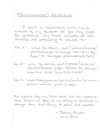
|
More... |
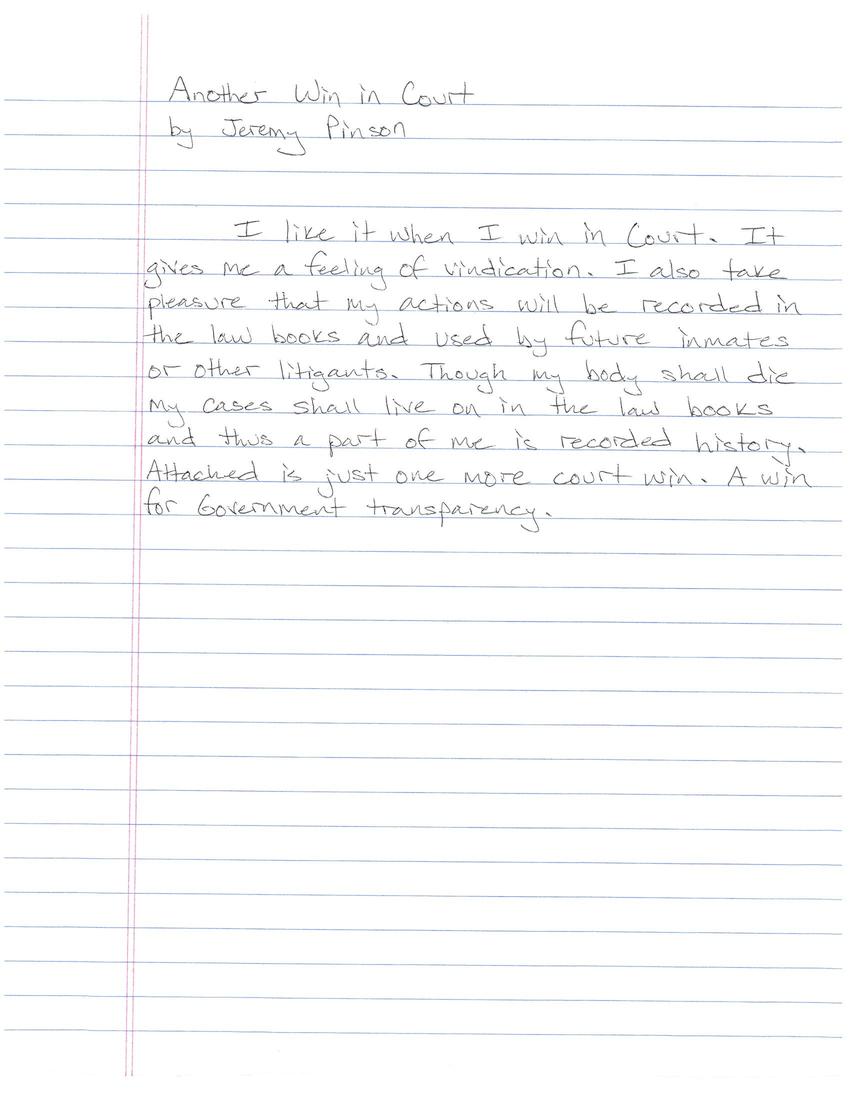
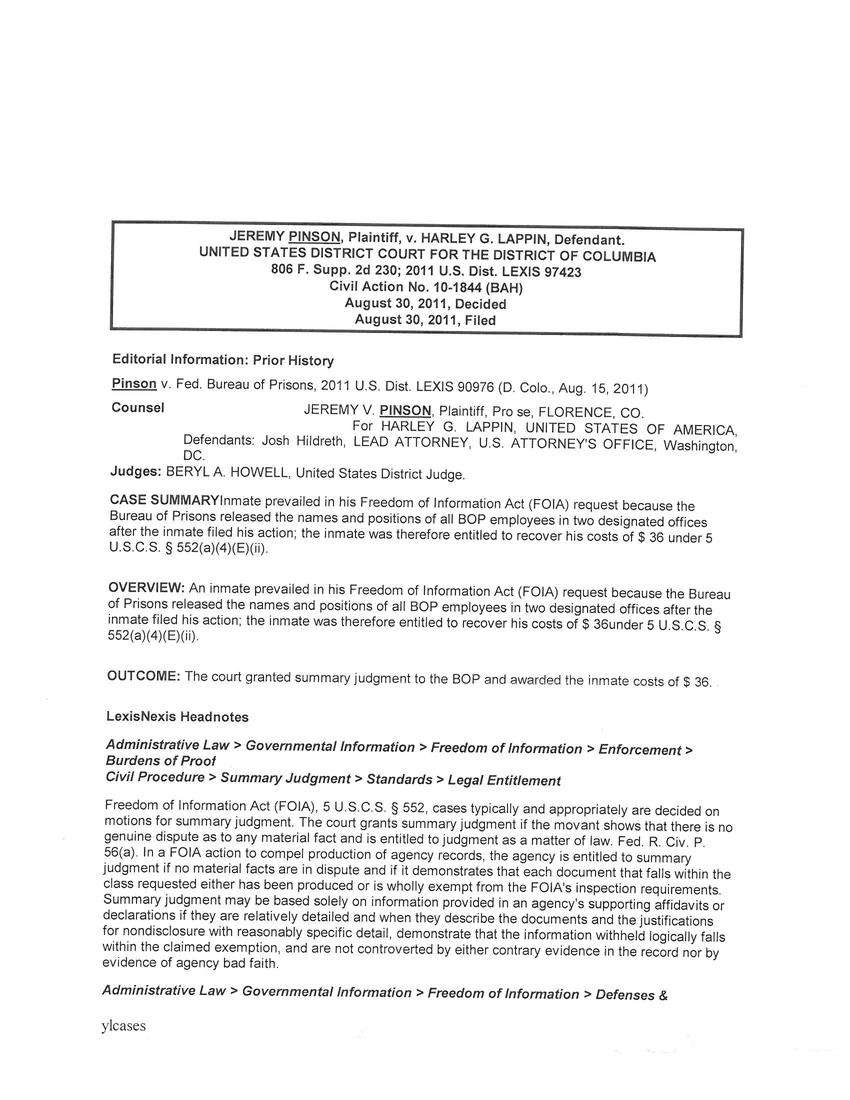
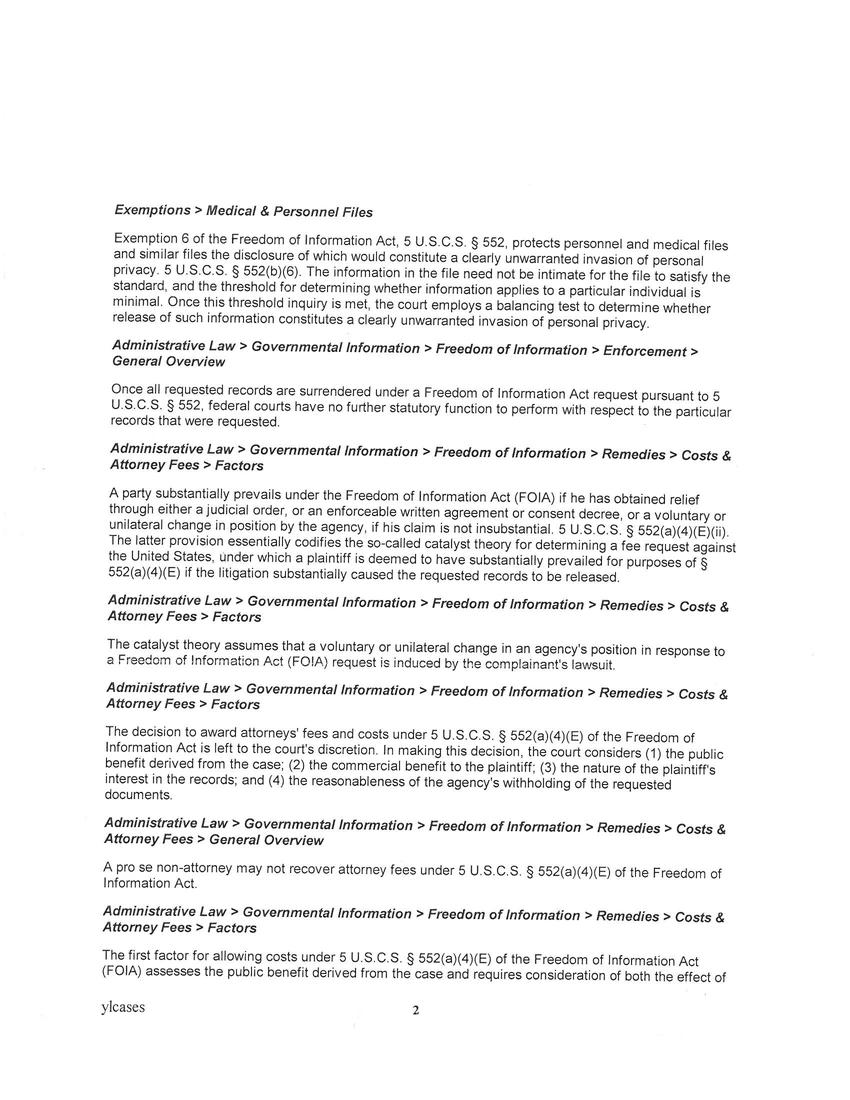
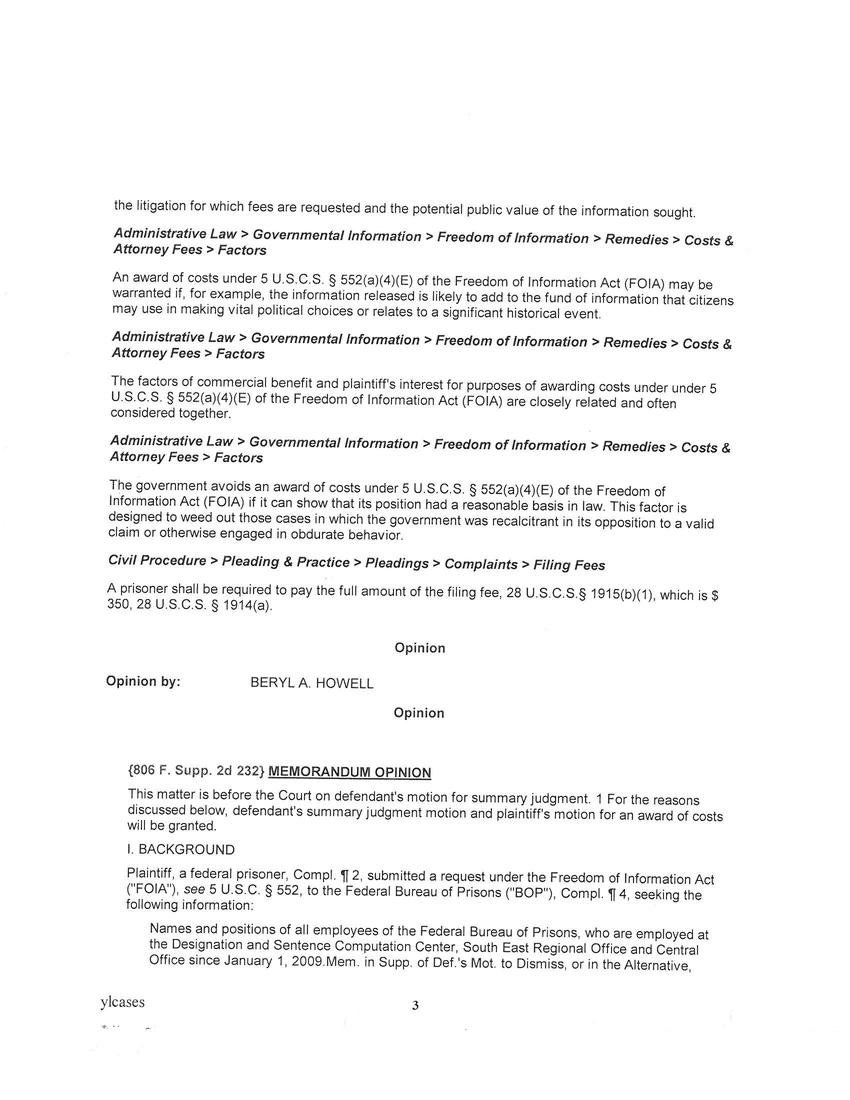
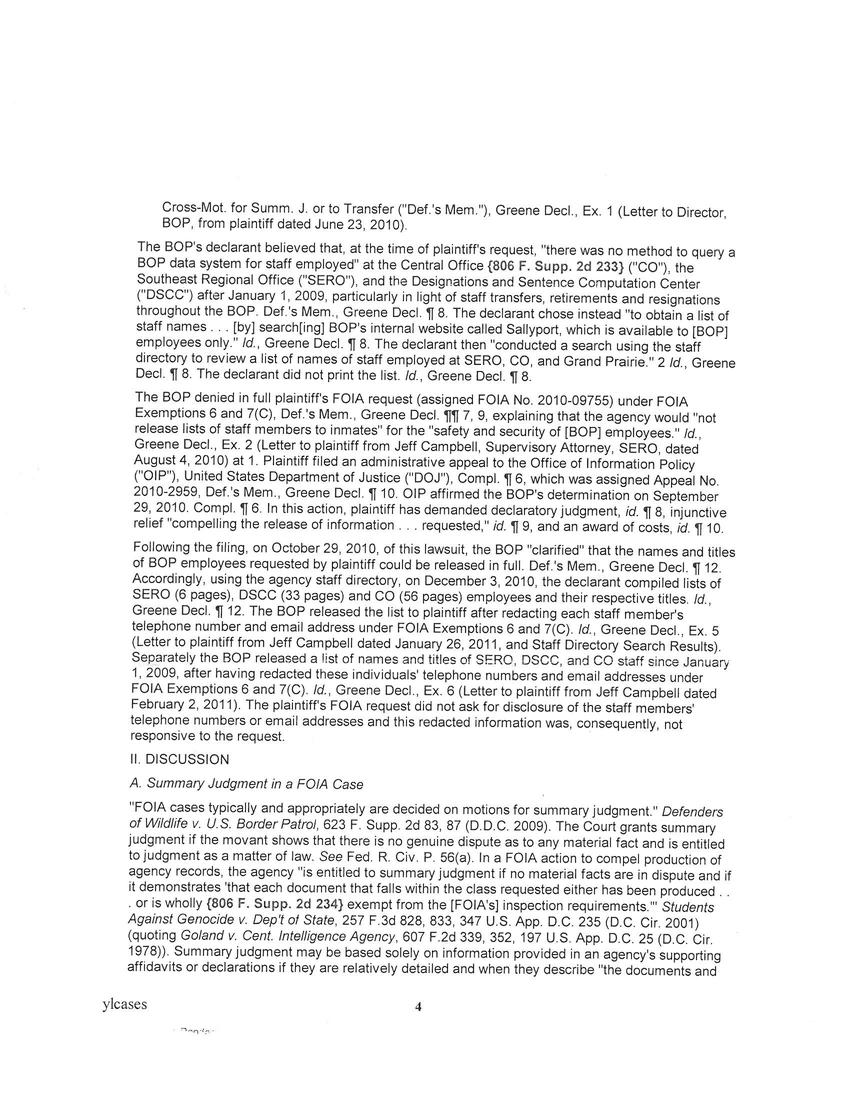
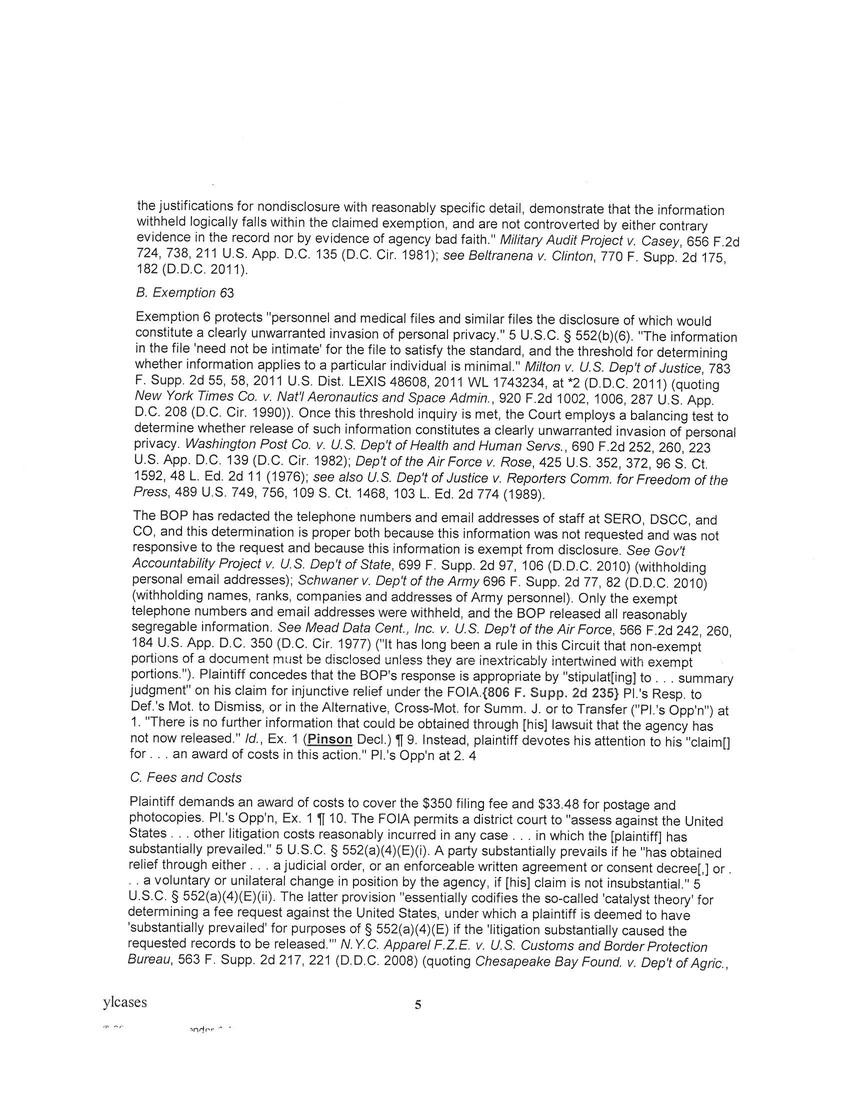

Replies (2)
I hope the card I sent reached you in time and that you find some happiness in your special day. Take care Jeremy.
Nicki